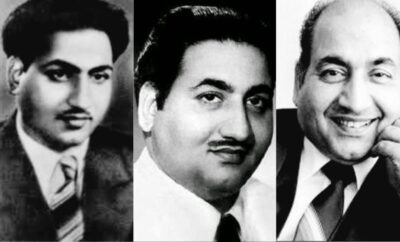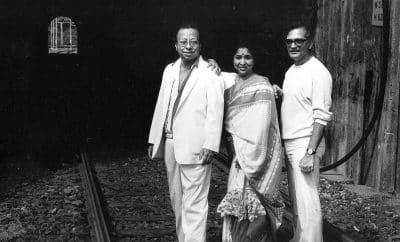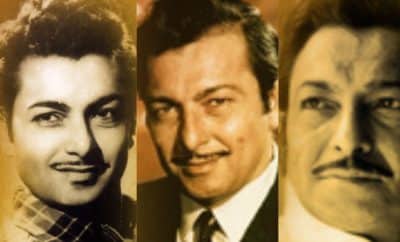Collections
Madan Mohan and Talat Mahmood – Confluence of the Kings of Ghazal
When one pronounces the two magical words “Madan Mohan”, what starts playing on a music lover’s mind are all the mellisonant melodies with which the magician of music has persistently spoilt the listeners for choice for over two decades.
His name is synonymous with finest ghazals that Hindi films have ever had. The name also reminds us of sentimental tunes widely exploring different shades of pathos, that leave an ever-lasting impression in our minds despite sparse and minimalistic orchestration. He unfortunately did not get a due share of success in materialistic terms, for he preferred remaining honest to his art rather than spending the time and energy on ideas to encash it. That is why, whatever music he created was consistently memorable and is cherished by music lovers even today, decades after its creation.
When Madan Mohan’s music is discussed, what is largely talked about is his joint repertoire with Lata Mangeshkar. A school of thought says that there remains nothing in Madan Mohan’s music, if Lata Mangeshkar is subtracted. No doubt, they complemented each other very well and made a legendary pair, but there is still a lot to his music sans Lata Mangeshkar – for example, numerous velvety and sentimental ghazals and songs in Talat Mahmood’s silky voice! Besides Anil Biswas and C. Ramchandra, Madan Mohan was one of the very few composers, who made a beautiful use of the unique texture of Talat Mahmood’s voice.
Though the emperor of ghazals – Talat Mahmood – who had a silken voice with a unique tremolo, could never make it to the league of the always-in-demand versatile playback singers like Mohammed Rafi and Kishore Kumar due to the peculiar texture of his voice, he always remained the playback singer of choice of a few composers including Madan Mohan for soulful and romantic songs due to this very quality. He also sang numerous non-film songs, most of which were ghazals, the genre that best suited his voice.
Soon after shifting from Kolkata to Mumbai in 1949 to try his luck with Hindi films and getting a big break with Anil Biswas’s “Aye dil mujhe aisi jagah le chal” (Arzoo – 1950), Talat Mahmood got an opportunity to sing under Madan Mohan’s baton in Ada and Madhosh (both released during 1951). Here is a glimpse of a few feather-soft melodies that the duo went on to please the music afficionados with, starting therefrom.
1. Meri Yaad Mein Tum Na Aansoo Bahaana (Madhosh – 1951)
This is a soulful song expressing the woe of partition with the beloved, through Raja Mehdi Ali Khan’s befitting words and Madan Mohan’s moving composition orchestrated mainly with violins and sitar, which is rendered by Talat Mahmood in a heart wrenching way.
Soon after Talat Mahmood kicked off his career as a playback singer, some gossip mongers started spreading rumours about difficulty in recording his songs due to the tremolo in his voice and music directors started avoiding him. Though a few music directors like Anil Biswas and Madan Mohan still continued to confide in him, his popularity started going into a rapid descent. He was in a deep distress due to this when he was recording “Meri yaad mein tum na aansoo bahaana”. C. Ramchandra was present at the recording and was thoroughly impressed with Talat’s rendition. He acknowledged that Talat’s voice was good for recording and admitted that what he had heard about it were just rumours. Soon thereafter, C. Ramchandra proceeded to record Talat’s first song under his baton – “Muhabbat hi na jo samjhe” (Parchhain – 1952); and the commencement of another mellifluous alliance was marked.
2. Mera Qaraar Le Ja (Ashiana – 1952)
This is a haunting tandem song written by Rajinder Krishan and sung by Talat Mahmood and Lata Mangeshkar separately. Talat seems to be the perfect choice for the male version.
The film has another soulful Talat solo – “Main paagal, mera manwa paagal”.
3. Humse Aaya Na Gaya, Tumse Bulaaya Na Gaya (Dekh Kabira Roya – 1957)
The song is the expression of the hero’s dilemma in expressing his love that comes as a revelation to the heroine. Rajinder Krishan’s words, Madan Mohan’s sitar dominated composition and Talat Mahmood’s tender rendition make this song an aural treat.
4. Do Din Ki Muhabbat Mein Humne (Chhote Babu – 1957)
Chhote Babu has a poignant Talat solo – “Do din ki muhabbat mein humne”. The lyrics written by Kaif Irani draw a statement of account of what the hero has gained and lost in love – he has gained tears and lost the peace of life – what an irony! Talat has done a complete justice to Madan Mohan’s soulful composition by proficiently surfing through the very high and very low notes.
5. Yaad Jab Aaye Teri (Mohar – 1959)
Madan Mohan has composed this song in a little different style that usual, going somewhat close to the Arabic music. Rajinder Krishan’s words and Talat Mahmood’s rendition create a perfectly pensive mood.
6. Beraham Aasamaan, Meri Manzil Bata Hai Kahaan (Bahana – 1960)
Talat Mahmood, through his rendition, effectively brings to life the pathos and dejection contained in Rajinder Krishan’s words and Madan Mohan’s composition. He again traverses high and low notes effortlessly, without damaging the essence of the composition.
7. Phir Wohi Shaam, Wohi Gham, Wohi Tanhaai Hai (Jahaan Aara – 1964)
While Talat Mahmood had gradually started becoming a name rarely seen in the Hindi cinema starting the early 1960s, Madan Mohan revived it by using his voice in three solos in Jahaan Aara, viz., “Phir wohi shaam, wohi gham, wohi tanhaai hai”, “Main teri nazar ka suroor hoon” and “Teri aankh ke aansoo pee jaaon”. The first one, a profoundly emotional song written by Rajinder Krishan, decorated by Madan Mohan with flute, sitar and violins and rendered by Talat Mahmood magnificently, is a personal favourite.
While the producer of the film was insisting on Rafi as the playback singer for the hero, Madan Mohan was hell bent on using Talat’s voice, considering the soft-hearted character. When reconciliation seemed impossible, Madan Mohan was all set to let go of the film, and the producer finally agreed to using Talat’s voice. Though the film did not do well at the box office, all the songs including the three Talat solos are fondly remembered by the connoisseurs even today.
Apart from the solos, Talat Mahmood has also rendered a handful of beautiful duets under Madan Mohan’s music direction, mainly with Lata Mangeshkar, for example, “Ye nayi nayi preet hai” (Pocket Maar – 1956), “Teri chamakti aankhon ke aage” (Chhote Babu – 1957) and “Tumhi to meri pooja ho” (Suhagan – 1964).
Wish the duo created many more songs together and we could endlessly float on the downy clouds of these soft melodies!




Madhupati Sharma
June 25, 2022 at 9:40 am
You have picked “Diamonds are forever”. Duet with Lata – Teri chamakti aankhon ke aage..” is also a favourite from the pair in ghazal category.
Yogesh
July 2, 2022 at 11:11 pm
Thanks, Madhupati ji!
Prakash Maharana
September 23, 2022 at 12:47 am
Great Work, Thanks Yogesh ji